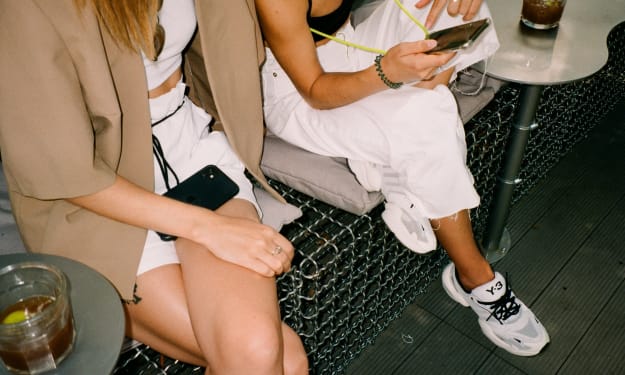Can All Friendships Endure Sobriety?
Any time someone quits drinking they take the risk of losing some friends.

Early on in the Covid pandemic my two best friends and I began keeping in touch (and occupying our abundant, newfound free time) by sending video messages through Marco Polo. Not only did the app keep us connected — allowing us to share long-winded stories and the kinds of mundane details that never make their way into texts — but it also cut out the core challenge for any triad of friends: keeping each friend equally up to date.
Now, even as some normalcy has returned and our days are far more occupied than they were one year ago, we continue to send video messages most days to better stay close.
The other night, after I logged out of my work computer for the day, I opened up the app to see that I had two notifications. One video from each of them waiting to be watched. With a single click on the chat group, my friend Stephanie’s face appeared on my screen. Sitting on her back patio, speaking through the screen, she cracked open an Athletic Brewing non-alcoholic beer.
“I got some Athletic beers,” she said to the camera in a sing-song voice, “This one is the golden… it’s delicious! It’s really just enjoyable to sit and drink and then know that nothing is gonna happen. It’s a really awesome feeling.”
Two kinds of drinkers
Stephanie isn’t sober. Neither is my other best friend, Kelsey. And yet, they have both been instrumental in my own sober journey.
They’ve offered support through the hard times, like the first time I went to a party after quitting, they’ve offered advice and words of wisdom when I’ve felt low, and they’ve regularly checked in whenever we’ve been in drinking situations together to ensure that their own drinking wasn’t making me uncomfortable.
When Stephanie got married in September, I wasn’t too worried about my sobriety being tested at her wedding. I’d built a strong foundation over the previous 14 months and my joy and excitement far outweighed any impulse to get drunk. The first night of the wedding weekend was a reception held at a local brewery. Kelsey, the maid to my matron of honor, and my forever backup date when my husband has to work, and I arrived together and remained side-by-side the majority of the night.
After an hour had passed, I noticed Kelsey had yet to finish her first beer.
“Please don’t feel like you can’t drink because of me. I’m fine, honestly.” I said to her.
The truth is, I had been a bit disappointed that the brewery didn’t offer any non-alcoholic alternatives besides water. I’ve found that most places, including most breweries, provide at least 1–2 options. Kelsey knew I was feeling a little frustrated and I didn’t want that to ruin her good time.
“I don’t feel that way. I’m not drinking water because of you — my stomach kind of hurts and I’m just not really feeling it tonight. I’ll have another beer in a bit, I’m sure.” She responded, calmly.
It occurred to me that I was projecting my old thought patterns from when I was a drinker onto her. Before I quit drinking, I couldn’t have fathomed being at a lively, social, joyous occasion such as a wedding weekend kick-off event without the aid of alcohol; so, I assumed she felt that way too. I forgot for a moment that not all drinkers are created equally.
As I reflect on the ways our friendship has grown since I quit drinking, I can’t help but wonder if the love and bond the three of us share would have been strengthened in this way if they were big drinkers.
If they hadn’t established their own healthy relationships with alcohol, would our friendship have survived my sobriety?
Two kinds of friendships
Any time someone quits drinking they take the risk of losing some friends.
Back when I was still drinking, I was the queen of distancing myself from non-drinkers. Absurdisms like “I don’t trust people who don’t drink” and “why are they even here if they’re not going to drink with us?” were uttered with embarrassing regularity.
It’s easy now to look back and recognize that what I was experiencing was the all too familiar blend of jealousy and insecurity. I hated how much I relied on alcohol in social situations and I deeply envied cool, confident people who didn’t need or want it.
So, it’s safe to say that I likely wouldn’t have maintained a friendship with a newly sober person when I was still a drinker. In fact, I’m ashamed to say, on more than one occasion I goaded my friends who were trying to moderate or take a break altogether until they got flat-out drunk with me.
The version of me that existed when I was still drinking is, perhaps, an extreme example; but, there is a definitive in-crowd mentality that accompanies drinking activities, and those who partake, leaving the rest of us doing the uncomfortable work of fitting into a mold we’ve broken out of while simultaneously managing the potential discomfort of those around us.
These days I often feel the pain of being on the outside. I continuously push myself to go on the same way I always did and then blame the people around me for my feelings of displacement.
I so desperately want to maintain a connection to the robust, albeit expensive and wildly unhealthy, social life I once had; and yet, I routinely relent to my true desire to be home, in the warm comfort of an alcohol-free environment, after only a couple of hours.
Sobriety is an act of bravery; it’s a loud and fantastic vow to one’s own well-being. So why do I feel like I must fold again and again until I begin to rip at my edges in the name of alcohol-laden friendships?
Rather than work to fit into the world I once occupied, what if I accepted that the friends who want to and can, will work to fit into my new world?
Perhaps it’s really not a matter of whether all friendships can endure sobriety, but whether they should.
About the Creator
Taylor Moran Writes
I write about sobriety & mental health. Subscribe to my weekly newsletter here: https://www.gratefullysober.com/






Comments
There are no comments for this story
Be the first to respond and start the conversation.